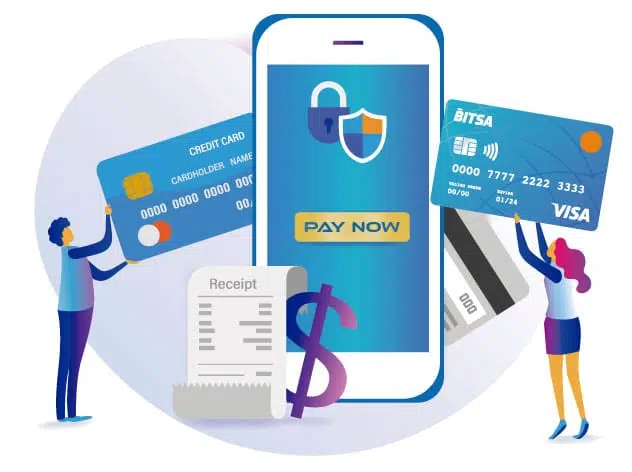
Difference between credit, debit and prepaid card. What is the best option for you?
Learn the difference between credit, debit and prepaid card, their advantages and disadvantages
Nowadays, most people use the term Credit card, referring to any card used to make transactions with money deposited in it, such as payments or withdrawals.
Hands up, who’s never got confused, using the term Credit Card, referring, for example, to a prepaid card. And this is perfectly normal since credit, debit and prepaid card have many characteristics in common.
However, we must remember that these cards, even if they are accepted in most stores, both physical and online, are not the same and have some differences that make them “useful” only for specific customer profiles.
For this reason, today we will try to clarify their characteristics and peculiarities, as well as the advantages and disadvantages that exist when using each of them.
Keep reading to find out what is the difference between credit, debit and prepaid card and what is the best option to choose.
Advantages and disadvantages of credit, debit and prepaid cards. Which one to choose?
Credit Card
The credit card is one of the most popular electronic payment instruments in the world but, unlike other types of cards, although it is tied to a credit institution, generally to a current account, the money is not taken directly from the balance available in the our bank account, but we are ‘lent’ by the issuing bank.
What does it mean? When we make a purchase and pay by credit card, the money we spend is not our own money (we do not withdraw it from our bank account), but we borrow it from the bank that issued the card, and we will return it in accordance with the methods provided by the bank (paying fairly high interest). This is why this card has a daily credit limit beyond which we cannot spend and which depends on each type of contract concluded with the bank.
What can you use a Credit Card for and what are its advantages?
With a Credit card, you can make any kind of payments and banking transactions such as:
- Make online purchases in all virtual shops that accept card payments, based on the accepted circuit (Visa, MasterCard, American Express, etc.);
- Buy in all stores that have a POS (Point of Sale) able to read credit cards and connect to the reference circuit;
- Withdraw cash at the ATMs that accept the reference circuit card.
- Pay your households (electricity, water, gas, etc.)
One of the most important characteristics of a Credit card is the security and protection of purchases since this type of card uses cutting-edge security technologies. In the event of theft, any attempt to the unauthorized use of the same can be easily blocked.
Disadvantages of Credit Card
After discovering how it works and its advantages, it is good to list now what are considered the disadvantages and the “most common dangers” in using a Credit card.
Among these we find:
– The freedom to spend that, whilst allows you to spend like crazy, could make it difficult to keep control of your money and give you an unpleasant surprise when you give back to the bank the whole amount. So be careful not to spend more than what you have on your account.
– Interest Charged on Purchases. Credit cards have high-interest rates that are charged on all purchases and withdrawals made. So, if you don’t want to be charged a lot of money, once again, be careful what you spend.
– Difficulty in requesting a credit card. If you do not have a bank account and you do not have the possibility to open one, for your bank records or for any other reason, requesting and obtaining a credit card will be even more difficult, since you will be required various requisites, essential to obtain credit (income, employment, debt level, etc.).
– Operating costs. Another major disadvantage in using a credit card is the high fees and costs applied annually for the management and maintenance of the card and the bank account.
Debit Card
A debit card is also one of the most widely used tools for making payments online and in physical stores, safely and immediately.
Unlike a credit card, the debit card is associated with a bank account and, for any purchase made, the money is taken directly from your account and is not ‘borrowed’ by the bank, as with a credit card.
This means that the money you spend is yours since you are immediately charged to the bank account with which the card is associated.
What can you use a Debit Card for and what are its advantages?
The Debit Card can be used to:
- Purchase and pay in physical stores via a POS terminal.
- Buy and pay online on most web platforms.
- Withdraw cash at ATMs.
- Make purchases and pay abroad. This depends however on the type of circuit the card is associated with (Maestro, Visa Electron, etc.).
- Payment or direct debit of the household bills (water, electricity, gas, Internet, etc.).
Among the main advantages in using a Debit Card we find:
– Expenses control: since the money you spend is deducted from the savings you have in your bank account, there is no danger of spending more than you have on your account. Furthermore, as it is associated with your bank account, you can check all the expenses and withdrawals, simply by consulting your account statement.
– Lower commissions: compared to a credit card, lower commissions are applied to a debit card. Most debit cards are also free, as they are normally included in the opening of a bank account.
– They are easy to request: to get a debit card you will only need to open a bank account, without having to meet all the requirements to obtain a credit card.
Disadvantages of Debit Card
Like any banking product, the Debit Card also has some disadvantages. Let’s see what they are:
- Lower security and protection levels: compared to a credit card, the Debit Card usually offers lower levels of protection against possible fraud. Theft of the user’s PIN, using skimming devices, is much simpler and it will be easier to use the debit card behind your back for internet transactions. Furthermore, in many cases, they are not covered by travel or theft insurance and do not have a protection system for purchases.
- Transaction limit (daily, weekly or monthly) usually set by the bank that issues the card.
- Inability to build your credit history to obtain future loans from a bank.
Prepaid Card
Prepaid cards have evolved to the point of becoming an alternative to the bank account. Prepaid cards are very similar to debit cards, with the great difference of not being associated with any bank account.
To use it you must recharge it with the amount you plan to spend and, once the balance is spent, you will need to top it up. For this reason, it is usual to call them rechargeable cards.
In some cases, they may have associated an IBAN code that allows them to carry out the basic operations of a bank account (crediting the salaries, paying bills, and make other types of transactions).
One of the biggest advantages of a prepaid card is that not being linked to a bank account, it is easy to request since credit checks are not carried out.
What can you use a Prepaid Card for and what are its advantages?
Prepaid cards can be used to carry out almost all the operations that are performed with a bank account such as:
- Making purchases in most stores, at home and abroad, and without commission;
- Buying online on any type of web, as they generally have internationally accepted circuits;
- Withdrawing in almost all ATMs, even abroad, without having to pay high fees;
- Paying any kind of utilities online and through a smartphone;
- Those with IBAN are able to execute and receive bank transfers.
- High level of security and fraud protection. If you are worried about card fraud and identity theft, a prepaid card could be a good option as it is not linked to your bank account and is protected by Pin. In case of theft or loss, it can be replaced and the only money you risk losing is the one you have loaded on the card.
Surely one of the main advantages of owning a prepaid card is the spending limit. With a prepaid only you can spend what you have recharged and you don’t risk going into debt and spending more than you own. You can also check your expenses online and by phone to get everything under control.
Main disadvantages of Prepaid Cards
No protection on purchases. Most prepaid cards do not offer insurance on purchases and travel, as is the case with credit cards.
Spending limit: the advantage of controlling your expenses, so as not to spend more than you have, can also be a limit, in case you need more liquidity to cope with some unexpected expense.
Credit, Debit and Prepaid card. Which one to choose?
After seeing all the features, benefits, and limitations of each type of card, you are now wondering: which of them is the best option?
As we mentioned above, there is no ideal solution, since each type of card is designed for a particular user profile and each of them can satisfy each person’s expectations and needs in a different way.
We have seen how the credit card can be the ideal solution for those who want to spend without limits and in any part of the world, being able to make any type of purchase and is accepted anywhere in the world. Furthermore, protection on travel and purchases is one of the most interesting advantages and features of this type of card.
However, if you can’t control your expenses, and you risk buying in an irresponsible way, spending much more than what you can afford, surely the credit card is not the ideal solution for you.
The debit card, on the other hand, appears to be the best option for those who need to withdraw cash as the fees are minimal or nil.
However, if you do not want your card to be tied to a bank account and wish to maintain more control over your expenses, as well as a higher level of security, the best option to adopt is undoubtedly the Prepaid Card.
As we have seen before, prepaid cards offer almost all the advantages of credit cards and debit cards, as well as guaranteeing higher levels of security, since they are not linked to the bank account.
So if you don’t have and don’t want to open a bank account, if you prefer to spend only what you have on your card and want to be able to travel, paying and withdrawing money anywhere in the world, the Prepaid Card is the ideal solution.
An example is BITSA, since it brings together all the features and benefits of a normal prepaid card, as well as boasting unique features.
With Bitsa you can buy online or in any store, without being associated with a bank account.
Also Bitsa allows you to:
– Make online purchases safely, thanks to Verified by Visa technology (Secure payment);
– Pay in stores around the world;
– Withdraw cash from any ATM and through a PINCASH in thousands of stores;
– Carry out SEPA transfers;
– Make payments between cards;
– Top up the card with vouchers and cryptocurrencies.
If you are a lover of travel and adventure … Bitsa is the cheapest way to spend abroad!
SPEND WHERE AND WHEN YOU WANT … EVERYTHING WHERE VISA IS ACCEPTED!
